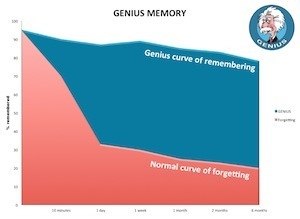 I’m often asked what’s the difference between long-term and short-term memory, but I’m buggered if I can remember!
I’m often asked what’s the difference between long-term and short-term memory, but I’m buggered if I can remember!
Ha ha!
Of course, the clue’s in the question!
If you want information to still be there in your head, when you need it later on, you need to turn short-term memory into the longer sort.
And there are specific things that you need to do in order to achieve that, Otherwise, because we’re hardwired to forget, you’ll lose that information as fast as you gain it.
And very quickly too. We are so good at forgetting that whatever it is you’re learning, you will have forgotten about 80% of it within 24-hours. No, really!
 Here’s what it looks like. The pink area shows you the usual pattern of forgetfulness, and as you can see, most people will have forgotten most of what they’ve learnt in a matter of hours, and continue forgetting ad infinitum. Useful trick!
Here’s what it looks like. The pink area shows you the usual pattern of forgetfulness, and as you can see, most people will have forgotten most of what they’ve learnt in a matter of hours, and continue forgetting ad infinitum. Useful trick!
Sometimes!
As I’ve said before, we’ve evolved to forget older information in favour of new information which is more likely to keep us alive and well. Physiologically, although our surroundings have changed enormously, we’re pretty much the same as we were 10,000 years ago when we lived in caves. You can imagine how useful it was to remember where the herd of deer (in other words, ‘dinner’) were yesterday afternoon, rather than where they were three months earlier.
Likewise, how much more useful is it for us to forget where our car keys were five years ago and instead, remember where they were this morning, or indeed five minutes ago.
So forgetting is useful.
Sometimes!
But if you want to remember something long-term, you need to get it into your long-term memory and then keep it there. When you do that successfully you will remember pretty much all of that information forever.
Look at the blue area and see the difference to the information in your long-term memory when you know how to do that.
So what do the vast majority of people do when they study? How do they attempt to learn and retain information?
 Well, I reckon, when revising for exams, most people’s short-sighted strategy falls into one of two camps:
Well, I reckon, when revising for exams, most people’s short-sighted strategy falls into one of two camps:
The first lot, in Camp 1 write out every word in their text book.
The trouble with this is that the more you write the more you forget. Hey! We can’t help it! It’s just the way our brain works.
The other lot, in Camp 2 read and reread their text book.
And that sends your brain to sleep! You know it does! Don’t tell me you’ve never ‘come to’, realising you haven’t taken in a word of the last paragraph you’ve just read? And don’t tell me you’ve never read that same paragraph over and over, and each time realised you still haven’t taken it in?
Yep! Knew it!
You can’t help it. It’s just the way your brain works!
So the best advice I can give you, if your revision strategy falls into camp one or two, is…
Stop camping!
Instead, do something that works!
And if you want to find out what that is, sign up for my webinar, and I’ll tell you!

